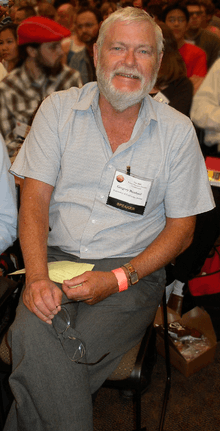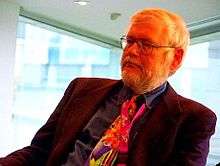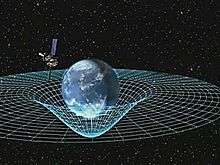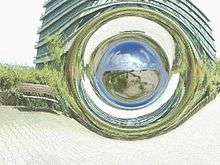
Science is like literature, a continuing dialog among diverse and conflicting voices, no one ever wholly right or wholly wrong, but a steady conversation forever provisional and personal and living.
Gregory Benford (born January 30, 1941, in Mobile, Alabama) is an American science fiction author and astrophysicist who is on the faculty of the Department of Physics and Astronomy at the University of California, Irvine.
Quotes

Disintegration of structure equals information loss.


If you were damned certain you weren’t looking for something, there was a very good chance you wouldn’t see it.

No matter how much you plan for it, the real thing seems curiously, well, unreal.

Any technology that does not appear magical is insufficiently advanced.
Short fiction
In Alien Flesh (1986)
- All page numbers from the first mass market paperback edition published by Tor ISBN 0-812-53176-0
- Talkers never acted when they could talk.
- Redeemer, p. 53 (Originally published in Analog, April 1979)
- “You know, my dear, you’re wrong that suffering ennobles people.” She’d stopped to massage her hip, wincing. “It simply makes one cross.”
- Nooncoming, p. 100 (Originally published in Universe 8, edited by Terry Carr), 1978
- As Kurt Vonnegut pointed out in his first novel, Player Piano, some people love problem-solving and tinkering—and that is the final, irreducible driver of human history. Wars and faiths and leaders come and go, but the problem-solvers’ slow, steady work is the fulcrum upon which history turns.
- Afterword to Nooncoming, p. 104
- Trouble comes looking for you if you’re a fool.
- To the Storming Gulf, p. 126 (Originally published in Fantasy & Science Fiction, April 1985)
- Must admit it felt good. First time in years anybody ever admitted I was right.
- To the Storming Gulf, p. 142
- He went to Los Angeles to do the work even though he hated the city; it was full of happy homogeneous people without structure or direction. While on the bus to work, it seemed to him Los Angeles went on long after it had already made its point.
- White Creatures, p. 170 (Originally published in New Dimensions 5, edited by Robert Silverberg), 1975
- But the answers come when they will, one piece at a time.
- Exposures, p. 232 (Originally published in Asimov’s, July 6, 1981)
- I would have to look, try to find a bridge that would make plausible what I knew but could scarcely prove. The standards of science are austere, unforgiving—and who would have it differently? I would have to hedge, to take one step back for each two forward, to compare and suggest and contrast, always sticking close to the data. And despite what I thought I knew now, the data would have to lead, they would have to show the way.
- Exposures, p. 244
- A science fiction writer is—or should be—constrained by what is, or logically might be. That can mean simple fidelity to facts (which, in science, are always more important than theories—though Lord knows the two help shape each other, undermining the convenient, complacent separation of observer and observed). To me it also means heeding the authentic, the actual and concrete. Bad fiction uses the glossy generality; good writing needs the smattering of detail, the unrelenting busy mystery of the real.
- Afterword to Exposures, p. 246
- Thunder impresses, but it’s lightning does the work.
- Time’s Rub, p. 253 (Originally published in Asimov’s, April 1985)
- In its studies and learned colloquy, Faz saw and felt the tales of Men. They seemed curiously convoluted, revolving about Self. What mattered most to those who loved tales was how they concluded. Yet all Men knew how each ended. Their little dreams were rounded with a sleep.
So the point of a tale was not how it ended, but what it meant. The great inspiring epic rage of Man was to find that lesson, buried in a grave.- Time’s Rub, pp. 260-261
- Nothing could be sure it was itself the original. So the only intelligent course lay in enjoying whatever life a being felt—living like a mortal, in the moment.
- Time’s Rub, p. 261
- The role of boredom in human history is underrated.
- Doing Lennon, p. 266 (Originally published in Analog, April 1975)
- Every age is known by its pleasures, Fielding reads from the library readout. The twentieth introduced two: high speed and hallucinogenic drugs. Both proved dangerous in the long run, which made them even more interesting.
- Doing Lennon, p. 268
The Man Who Sold The Stars (2013)
- Originally published in Starship Century: Towards the Grandest Horizon. Page numbers from reprint in Ed Finn & Kathryn Cramer (eds.) Hieroglyph: Stories and Visions for a Better Future (2014), ISBN 978-0-06-220469-1
- Schools praised diversity but were culturally the same. Different skin color, same opinions.
- p. 318
- Marches don’t stop markets.
- p. 319
- Manufacturing creates wealth, services distribute it.
- p. 320
- A rich bank account did not mean rich ideas; in fact, often the reverse. The bigger your ass, the more you want to cover it.
- p. 338
- He didn’t regret growing older, it was a privilege denied to many.
- p. 342
- Boundaries got redrawn at the point of a sword, and the legal frame followed.
- p. 342
In the Ocean of Night (1977)
- Disintegration of structure equals information loss.
- The Snark, a member of a machine-intelligence civilization, p. 195
- Organic forms are in the universe of things and also reside in the universe of essences. There we cannot go. … You are a spontaneous product of the universe of things. We are not. This seems to give you … windows. It was difficult for me to monitor your domestic transmissions, they fill up with branches, spontaneous paths, nuances…
- The Snark, p. 195
Timescape (1980)
- All page numbers from the mass market paperback edition published by Bantam Books
- Won the 1981 Nebula Award.
- They will do anything for the worker, except become one.
- Chapter 5 (p. 46, concerning the peers)
- “The peers just fill the air with their speeches.”
“And from what I've seen, vice versa.”- Chapter 5 (p. 46)
- Only fools get to join.
- Chapter 10 (p. 110, concerning the nuclear club)
- At least being prosperous set one apart in England; here it guaranteed nothing, not even taste.
- Chapter 11 (p. 134, concerning the USA)
- Everybody feels he has a right to a life of luxury — or at least comfort — so there’s a lot of frustration and resentment when the dream craps out.
- Chapter 11 (p. 136)
- Yes, perhaps that was it. For decades now the picture of the world painted by the scientists had become strange, distant, unbelievable. Far easier, then, to ignore it than try to understand. Things were too complicated. Why bother? Turn on the telly, luv. Right.
- Chapter 11 (p. 146)
- It was an example of what he thought of as the Law of Controversy: Passion was inversely proportional to the amount of real information available.
- Chapter 14 (p. 182, known as Benford's law of controversy)
- To shine is better than to reflect.
- Chapter 16 (p. 220)
- All right, he thought, so the details were not perfect. But maybe, in a sense, that was part of the magic, too.
- Chapter 16 (p. 229)
- There was something about such reflex stupidity that never failed to irritate him.
- Chapter 17 (p. 231)
- “One of the laws of nature,” Gordon said, “is that half the people have got to be below average.”
”For a Gaussian distribution, yeah,” Cooper said. “Sad, though.”- Chapter 17 (p. 234)
- (Crank theories) always violated the first rule of a scientific model: they were uncheckable.
- Chapter 17 (p. 235)
- Somehow to them, the press was always the judge of things scientific.
- Chapter 17 (p. 236, concerning cranks)
- “Free will again,” Cathy said.
“Or free won’t,” Peterson said mildly.- Chapter 23 (p. 291)
- If you were damned certain you weren’t looking for something, there was a very good chance you wouldn’t see it.
- Chapter 25 (p. 305)
- Religions do not teach doubt.
- Chapter 27 (p. 322)
- You had to form for yourself a lucid language for the world, to overcome the battering of experience, to replace everyday life’s pain and harshness and wretched dreariness with — no not with certainty but with an ignorance you could live with. Deep ignorance, but still a kind that knew its limits. The limits were crucial.
- Chapter 31 (p. 360)
- No matter how much you plan for it, the real thing seems curiously, well, unreal.
- Chapter 37 (p. 395)
- It was getting the results that made science worth doing; the accolades were a thin, secondary pleasure.
- Chapter 39 (p. 411)
- The personal was, compared with the tides of great nations, a bothersome detail.
- Chapter 43 (p. 441)
- Modern economics and the welfare state borrowed heavily on the future.
- Chapter 43 (p. 445)
- Science is like literature, a continuing dialog among diverse and conflicting voices, no one ever wholly right or wholly wrong, but a steady conversation forever provisional and personal and living.
- Afterword (p. 498)
Against Infinity (1983)
- All page numbers from the mass market paperback edition published by Bantam Spectra
- Nominated for the 1984 Nebula Award.
- Major Sánchez grunted. “Nice word, ‘trivial.’ Means you got it—cojones—you got no worry. If you don’t—”
- Part 1 “Beyond Sidon”, Chapter 2 (p. 12)
- Every boy knows he is immortal, but his parents, they are not so sure.
- Part 2 “Aleph”, Chapter 1 (p. 45)
- That thing doesn’t care about you. It won’t reward you when you take risks. It is simply indifferent. That’s the fact about it that most never learn. They hate it and fear it and finally ignore it. Because of that. It would be easier if it hated us. Maybe even if it hunted us. But it doesn’t care. Remember.
- Part 2 “Aleph”, Chapter 2 (p. 51)
- “You’ll never get it to follow orders.”
“Slaves follow orders, Colonel. You want something done a slave can’t, you don’t ask for a slave to do it.”- Part 2 “Aleph”, Chapter 3 (p. 68)
- Man doesn’t have to take a gamble just ’cause it’s there. You got to learn that.
- Part 2 “Aleph”, Chapter 3 (p. 68)
- “There’s plenty—”
“Plenty is exactly what there’s none of.”- Part 2 “Aleph”, Chapter 6 (p. 87)
- Soldiers for equality, uh? Glad you warned me. I’d have thought you were just thieves.
- Part 4 “Hiruko: Six Years Later”, Chapter 1 (p. 148)
- You got to learn to wait people out. Hear what they got to say. Not enough to have a majority rule, y’know. Otherwise, the minority won’t be convinced and they won’t support the plan. No point havin’ people at your elbow who’re against what you’re doin’. So we just got to talk it out Quaker-style till ever’body agrees. More efficient in the long run.
- Part 5 “Coming Home”, Chapter 3 (p. 179)
- Manuel stared at the place where Piet had been. The man he had known so little would now lie in this place far beyond the moon of Islam and the cross of Rome and the hammer of Marx, in a territory open and without plan, beyond man and his encasing theories, his filters, beyond the closed rooms of the civilized mind.
- Part 6 “Aleph Null”, Chapter 3 (p. 221)
- Once introduced into this world, life would never leave—there was no end to the explosive, consuming, voracious lust of long chain molecules to link and match and make of themselves yet more and more and again more.
- Part 6 “Aleph Null”, Chapter 4 (p. 226)
- Life was growing and spreading here the way a disease propagates and eats and in the eating must kill. There should be something more, he thought. A kind of being might come into the universe that did not want to finally eat everything or to command all or to fill every niche and site with its own precious self. It would be a strange thing, with enough of the brute biology in it to have the quick, darting sense of survival. But it would also have to carry something of the machine in it, the passive and accepting quality of duty, of waiting, and of thought that went beyond the endless eating or the fear of dying. To such a thing the universe would not be a battleground but a theater, where eternal dramas were acted out and it was best to be in the audience. Perhaps evolution, which had been at the beginning a blind force that pushed against everything, could find a path to that shambling, curiously lasting state.
- Part 6 “Aleph Null”, Chapter 4 (p. 226)
Artifact (1985)
- All page numbers from the mass market paperback edition published by Avon Eos (first printing; July 1998) ISBN 0-380-79195-1
- The past was a jigsaw puzzle and you never had all the pieces.
- Part 1, Chapter 1 (p. 10)
- But no, the friend’s indictment was off target; he simply liked them tall, as long as they didn’t slump down in a forlorn effort to appear shorter. It seemed obvious to him that no woman looked good trying to be something she wasn’t.
- Part 2, Chapter 1 (p. 42)
- That was what drew him to mathematics. Not because it was rarefied, but because it probed to the subtle, deeper reality. People said that mathematicians were unworldly, and yammered on about how Einstein couldn’t make correct change. Nonsense. Einstein just didn’t give a damn. It was the subtle, the beautiful that concerned him.
- Part 2, Chapter 6 (p. 76)
- It was one thing to be instantly attracted to a woman, and another to like her independence, the way she took no notice of what he thought of her, one way or the other. She was indeed a modern woman—not aggressive, yet not submissive. A self-possessed apartness, a lack of cling...
Yes, that was what held his attention: her reserve. The promise of depths you could not guess merely by seeing her in a swimsuit.- Part 2, Chapter 6 (p. 80; ellipsis represents a minor elision of narration)
- “We will be just like the USA. Only we will be more honest.”
”We’ve got two parties.”
“No you do not. You have only the party of the banks, of the money men, and they divide it into two pieces for your voting.”- Part 2, Chapter 7 (p. 86)
- Archeology is mostly a process of making associations between objects, and every discovery opens up possible resonances with things we already have. Sometimes, simply wandering through a museum or a site can open your eyes.
- Part 3, Chapter 1 (p. 107)
- Professors everywhere deplored examinations as an archaic technique, a fossil that recalled little red schoolhouses and memorizing the capitals of all the states. Regular progress and daily diligence mattered more, they felt, not an hour spent compressing months of learning onto a few sheets of paper. Far better to stress homework, classroom participation and the professor’s judgment. Regrettably, the large size of classes, and the requirements of society itself for pseudo-objective standards kept the exam structure firmly in place.
- Part 4, Chapter 1 (pp. 155-156)
- She stood up. “Professional? Ha! My father used to say, you have to be able to tell a tracheotomist from a cutthroat. Well, I can.”
- Part 4, Chapter 4 (p. 186)
- Maybe is not a theory, you know, it is merely maybe.
- Part 4, Chapter 6 (p. 203)
- Just because something’s crazy, doesn’t mean it’s wrong.
- Part 5, Chapter 1 (p. 228)
- She always dressed well, but he recognized the signs of insecurity; certitude was inversely proportional to the amount of makeup.
- Part 5, Chapter 3 (p. 243)
- Still, Claire hated Charlotte Brontë’s comment that she would have given all her talent to be beautiful. That condemned you always to play somebody else’s game—and, when your looks failed—finally to lose.
- Part 5, Chapter 4 (p. 245)
- This was what never failed to stir her—the unfathomable gulf between today’s thinking and the way the ancients thought. They were truly alien, not merely innocent agrarians with a foolish faith.
- Part 5, Chapter 4 (p. 246)
- In popularizing a scientific development it was always crucial to sail the narrow strait between the Scylla of professional contempt and the Charybdis of public befuddlement.
- Part 5, Chapter 7 (p. 270)
- Hubris. They disliked questions unless there were clear answers. They believed so much in their method that they conjured up certainty out of undeniable risk.
- Part 6, Chapter 6 (p. 349)
Foundation's Fear (1997)
- Any technology that does not appear magical is insufficiently advanced.
- This is derived from the third of Arthur C. Clarke's three laws : "Any sufficiently advanced technology is indistinguishable from magic." There are other variants which had inverted this including one known as Gehm's corollary, published several years earlier : "Any technology distinguishable from magic is insufficiently advanced." The earliest variant seems to be "Any sufficiently advanced magic is indistinguishable from technology." It has been called "Niven's Law" and attributed to Larry Niven by some, and to Terry Pratchett by others, but without any citation of an original source in either case — the earliest occurrence yet located is an anonymous one in Keystone Folklore (1984) by the Pennsylvania Folklore Society.
External links
This article is issued from
Wikiquote.
The text is licensed under Creative
Commons - Attribution - Sharealike.
Additional terms may apply for the media files.
